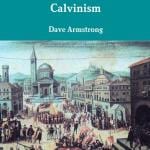vs. John Calvin

[excerpt from my book, A Biblical Critique of Calvinism (Oct. 2012, 178p), pp. 22-28. Follow the link for content and purchase information]
***
I’ll be using, the (public domain) translation of Institutes of the Christian Religion by Henry Beveridge, produced for the Calvin Translation Society in 1845, from the 1559 edition in Latin; reprinted by William B. Eerdmans Publishing Company (Grand Rapids, Michigan), 1995, and available online at the wonderful Christian Classics Ethereal Library site. My own Bible passages are from RSV. Calvin’s words will be in blue.
***
For our nature is not only utterly devoid of goodness, but so prolific in all kinds of evil, that it can never be idle. (II, 1:8)
Here I only wished briefly to observe, that the whole man, from the crown of the head to the sole of the foot, is so deluged, as it were, that no part remains exempt from sin, and, therefore, everything which proceeds from him is imputed as sin. Thus Paul says, that all carnal thoughts and affections are enmity against God, and consequently death (Rom. 8:7). (II, 1:9)
. . . it will be beyond dispute, that free will does not enable any man to perform good works, unless he is assisted by grace; indeed, the special grace which the elect alone receive through regeneration. (II, 2:6)
Therefore, since reason, by which man discerns between good and evil, and by which he understands and judges, is a natural gift, it could not be entirely destroyed; but being partly weakened and partly corrupted, a shapeless ruin is all that remains. In this sense it is said (John 1:5), that “the light shineth in darkness, and the darkness comprehended it not;” these words clearly expressing both points—viz. that in the perverted and degenerate nature of man there are still some sparks which show that he is a rational animal, and differs from the brutes, inasmuch as he is endued with intelligence, and yet, that this light is so smothered by clouds of darkness that it cannot shine forth to any good effect. In like manner, the will, because inseparable from the nature of man, did not perish, but was so enslaved by depraved lusts as to be incapable of one righteous desire. The definition now given is complete, but there are several points which require to be explained. (II, 2:12)
Therefore, since it is manifest that men whom the Scriptures term carnal, are so acute and clear-sighted in the investigation of inferior things, their example should teach us how many gifts the Lord has left in possession of human nature, notwithstanding of its having been despoiled of the true good. (II, 2:15)
. . . whatever is not illuminated by his Spirit is wholly darkness. (II, 2:21)
And, indeed if we admit that men, without grace, have any motions to good, however feeble, what answer shall we give to the apostles who declares that “we are incapable of thinking a good thought?” (2 Cor. 3:6). What answer shall we give to the Lord, who declares, by Moses, that “every imagination of man’s heart is only evil continually?” (Gen. 8:21). (II, 2:27)
Catholics and Calvinists agree generally speaking on original sin: the doctrine that all human beings were corporately affected by the fall of man and fell “in” Adam. It is found in passages such as Psalm 51:5; Romans 5:12-19; and 1 Corinthians 15:22. The dominion of the devil resulted from original sin, and caused a catastrophic disorder in the cosmos (Gen 3:15; Jn 12:31; 14:30; 2 Cor 4:4; 2 Pet 2:19; Heb 2:14).
Catholics also heartily agree that the unregenerate man is utterly unable to save himself or able to do anything whatsoever to turn to God and be justified or regenerated (Calvin asserts this in various ways in II, 2:20). That can only happen as a result of God’s grace.
What we deny is the Calvinist notion of total depravity, such that unregenerate man is “utterly devoid of goodness” or “true good” and that “everything which proceeds from him is imputed as sin” and that he is “incapable of one righteous desire” and that he can perform no good works whatever unless assisted by “the special grace which the elect alone receive through regeneration.”
For Calvin, then, a truly good work is literally impossible unless a man has already been regenerated by God; hence can be enabled by His grace to do good works.
This goes too far, and can’t be squared with biblical teaching. It’s a false “tradition of men” – deriving from prior positions and a philosophy that is brought to Scripture, rather than from Scriptural revelation itself. It forces Holy Scripture into a view that it doesn’t teach: much like trying to force a square peg into a round hole.
What do we make of, for example, King Jehoshaphat? He was subjected to the wrath of God, yet nevertheless the Bible informs us that he possessed some “good” and even sought God:
2 Chronicles 19:2-3 But Jehu the son of Hana’ni the seer went out to meet him, and said to King Jehosh’aphat, “Should you help the wicked and love those who hate the LORD? Because of this, wrath has gone out against you from the LORD. [3] Nevertheless some good is found in you, for you destroyed the Ashe’rahs out of the land, and have set your heart to seek God.”
2 Chronicles 20:32-33 He walked in the way of Asa his father and did not turn aside from it; he did what was right in the sight of the LORD. [33] The high places, however, were not taken away; the people had not yet set their hearts upon the God of their fathers.
Was King Jehoshaphat regenerated and hence ultimately saved? We simply don’t know. But if he wasn’t, he couldn’t do any true “good” at all, according to Calvin. The Bible clearly states that he “did what was right in the sight of the LORD”.
*
Yet it was a mixed record. He didn’t get rid of the “high places,” which were shrines to idols, and the last thing we learn about him was that he was condemned by a prophet because he allied himself with wicked King Ahaziah of Israel. How about King Uzziah? The Bible says he sought God too:
2 Chronicles 26:4-5 And he did what was right in the eyes of the LORD, according to all that his father Amazi’ah had done. [5] He set himself to seek God in the days of Zechari’ah, who instructed him in the fear of God; and as long as he sought the LORD, God made him prosper.
But Uzziah met an even more tragic end than Jehoshaphat:
2 Chronicles 26:16, 20-21 But when he was strong he grew proud, to his destruction. For he was false to the LORD his God, and entered the temple of the LORD to burn incense on the altar of incense. . . . [20] And Azari’ah the chief priest, and all the priests, looked at him, and behold, he was leprous in his forehead! And they thrust him out quickly, and he himself hastened to go out, because the LORD had smitten him. [21] And King Uzzi’ah was a leper to the day of his death, and being a leper dwelt in a separate house, for he was excluded from the house of the LORD. . . .
If Calvin wants to maintain that only a regenerate person can seek God and do any good at all, Uzziah must have been regenerated, but then how is his spiritual demise explained (since Calvin and Calvinists also deny the possibility of a truly regenerate, elect person ever falling away (unconditional election, irresistible grace, and perseverance of the saints)? If Uzziah was saved in the end (as he must be in the Calvinist schema, if it is accepted that he ever did a good work), again there is no text whatsoever that would indicate such a thing.
The case of King Asa presents yet another similar difficulty for Calvin and the Calvinist theological system. He had an initial zeal for God (2 Chr 14:11; 15:8-13). He destroyed idols (15:16), excluding the ones in the high places (15:17a), “nevertheless the heart of Asa was blameless all his days” (15:17b). Yet in the next chapter we observe his spiritual demise or backsliding (apostasy?):
2 Chronicles 16:7, 10, 12 At that time Hana’ni the seer came to Asa king of Judah, and said to him, “Because you relied on the king of Syria, and did not rely on the LORD your God, the army of the king of Syria has escaped you. . . . [10] Then Asa was angry with the seer, and put him in the stocks, in prison, for he was in a rage with him because of this. And Asa inflicted cruelties upon some of the people at the same time. . . . [12] In the thirty-ninth year of his reign Asa was diseased in his feet, and his disease became severe; yet even in his disease he did not seek the LORD, but sought help from physicians.
This scarcely presents King Asa as regenerated and saved. If not, how can it be claimed (under Calvin’s and Calvinists’ premises) that he ever “relied on the LORD” (2 Chr 16:8)?
The self-contradiction and tension in his position is so great that Calvin, to his credit, at least (probably unconsciously) feels compelled to create some sort of halfhearted loophole (though without biblical support):
But we ought to consider, that, notwithstanding of the corruption of our nature, there is some room for divine grace, such grace as, without purifying it, may lay it under internal restraint. . . . In the elect, God cures these diseases in the mode which will shortly be explained; in others, he only lays them under such restraint as may prevent them from breaking forth to a degree incompatible with the preservation of the established order of things. Hence, how much soever men may disguise their impurity, some are restrained only by shame, others by a fear of the laws, from breaking out into many kinds of wickedness. Some aspire to an honest life, as deeming it most conducive to their interest, while others are raised above the vulgar lot, that, by the dignity of their station, they may keep inferiors to their duty. Thus God, by his providence, curbs the perverseness of nature, preventing it from breaking forth into action, yet without rendering it inwardly pure.
. . . those are not common endowments of nature, but special gifts of God, which he distributes in divers forms, and, in a definite measure, to men otherwise profane. For which reason, we hesitate not, in common language, to say, that one is of a good, another of a vicious nature; though we cease not to hold that both are placed under the universal condition of human depravity. All we mean is that God has conferred on the one a special grace which he has not seen it meet to confer on the other. When he was pleased to set Saul over the kingdom, he made him as it were a new man. . . . The virtues which deceive us by an empty show may have their praise in civil society and the common intercourse of life, but before the judgment-seat of God they will be of no value to establish a claim of righteousness. (II, 3:3-4)
This almost becomes, in effect, a distinction without a difference. If Calvin isn’t careful with his “exception clauses” they may end up defeating his position, as too-numerous counter-examples that he hasn’t sufficiently explained away.
***
Photo credit: King Uzziah Stricken with Leprosy (c. 1639), by Rembrandt (1606-1669) [public domain / Wikimedia Commons]
***













